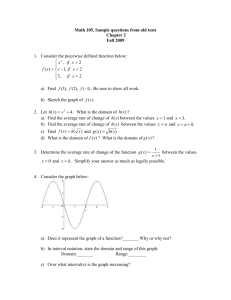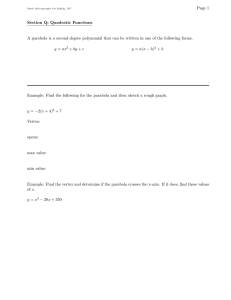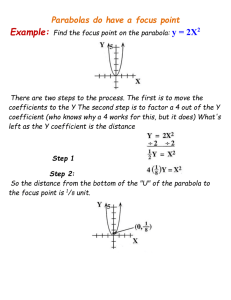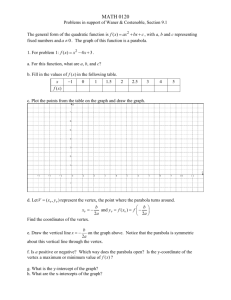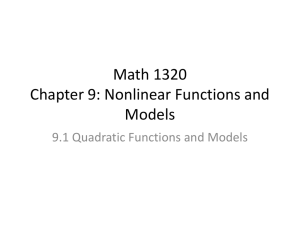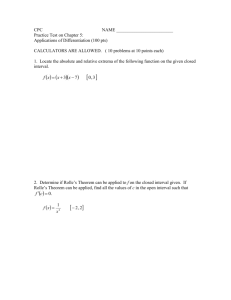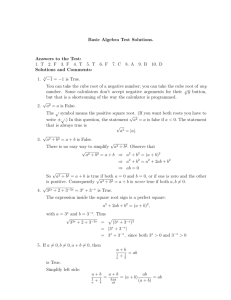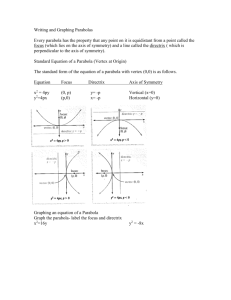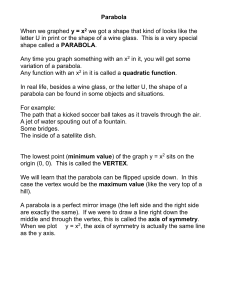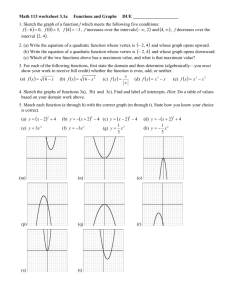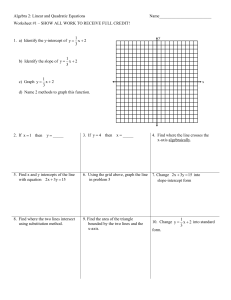Math 121 – More Practice Problems for Exam 2
advertisement
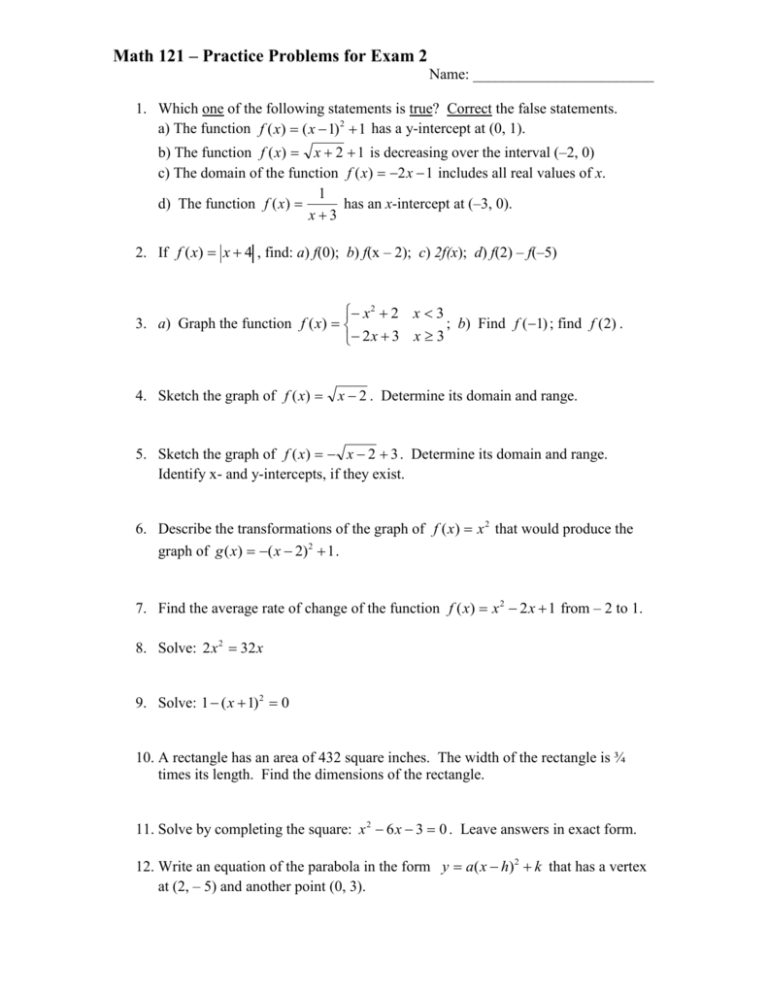
Math 121 – Practice Problems for Exam 2 Name: ________________________ 1. Which one of the following statements is true? Correct the false statements. a) The function f ( x) ( x 1)2 1 has a y-intercept at (0, 1). b) The function f ( x) x 2 1 is decreasing over the interval (–2, 0) c) The domain of the function f ( x) 2 x 1 includes all real values of x. 1 d) The function f ( x) has an x-intercept at (–3, 0). x3 2. If f ( x) x 4 , find: a) f(0); b) f(x – 2); c) 2f(x); d) f(2) – f(–5) x 2 2 x 3 3. a) Graph the function f ( x) ; b) Find f (1) ; find f (2) . 2 x 3 x 3 4. Sketch the graph of f ( x) x 2 . Determine its domain and range. 5. Sketch the graph of f ( x) x 2 3 . Determine its domain and range. Identify x- and y-intercepts, if they exist. 6. Describe the transformations of the graph of f ( x) x 2 that would produce the graph of g ( x) ( x 2)2 1 . 7. Find the average rate of change of the function f ( x) x 2 2 x 1 from – 2 to 1. 8. Solve: 2 x 2 32 x 9. Solve: 1 ( x 1)2 0 10. A rectangle has an area of 432 square inches. The width of the rectangle is ¾ times its length. Find the dimensions of the rectangle. 11. Solve by completing the square: x 2 6 x 3 0 . Leave answers in exact form. 12. Write an equation of the parabola in the form y a( x h)2 k that has a vertex at (2, – 5) and another point (0, 3). 13. An object is dropped from a height of 75 feet. Its height h (in feet) at any time t is given by h 16t 2 75 , where t is measured in seconds. Find the time required for the object to fall to a height of 35 feet. [Round answer to the nearest tenth.] 14. Solve: 8 12 1 t 3 x2 . Label x- and y-intercepts, if they x5 exist, and locate at least two points on each part of the graph. 15. Graph the rational function y f ( x) 16. a) Give an example of an odd function that is everywhere increasing. b) Give an example of an even function that has a zero of multiplicity 2 at the point (0, 0). 17. Sketch the graph of p( x) 2 x3 3x 2 . Label the x- and y-intercepts. What is the domain; and the range of p(x)? Find p(1), find p(– 2). For what values of x does p(x) = 0? 18. Find the zeros of the function g ( x) 4 x 4 10 x3 6 x 2 . State their multiplicities. 19. Over what interval(s) is the function g ( x) x 2 2 x 1 increasing? 20. A cyclist leaves Toronto at 10 am riding west. At noon, a car starts along the same road, driving 3 times as fast as the bike. When will the car catch up with the bike? 21. Construct a scatter diagram for these data points: (1, 1), (6, –1), (–2, 2), (3, 2), (–5, 4), (4, 0), (3, 1), (–1, –1), (–3, 3), (–4, 1). Draw a linear approximation of the data and calculate its equation. Answers: 1) c 2: a) 4; b) x 2 ; c) 2 x 4 ; d) 5. 3) a)The parabola opens downward, with vertex at (0, 2). The line and the parabola intersect at (1, 1) ; b) f (1) 1; f (2) 2 . 4) V: (2, 0); other points: (3, 1), (6, 2), (11, 3); D: [2, ∞); R: [0, ∞). 5) V: (2, 3); other points: (3, 2), (6, 1), (11, 0). D: [2, ∞); R: (–∞, 3); x-int: (11, 0); no y-intercept. 6) Move the vertex of the parabola 2 units to the right, flip it upside down, and move it 1 unit up. 7) 3 8) x = 0, x = 16. 9) x = 0, x = −2. 10) 18 in. by 24 in. 11) 3 12 [ 3 2 3 ]. 12) y 2( x 2)2 5 . 13) The time required is 1.6 seconds. 14) t 36 . 15) VA: x = −5; HA: y = 1; Pts: (0, 52 ) , (2, 0), (1, 16 ) , (−4, −6), (−6, 8). 23 16) Exampls: a) f ( x) 3 x ; b) f ( x) x 2 . 17) Intercepts: (0, 0) and ( 32 , 0) ; D: (−∞, ∞), R: (−∞, ∞); p(1) = −1, p(– 2) = −28; x = 0 and x 32 . 18) 3 (1), 0 (2), 12 (1) . 19) The function is increasing over the interval (1, ∞). . 20) The car will catch up with the bike at 1 pm. 21) y 14 x 32 is an approximation.
